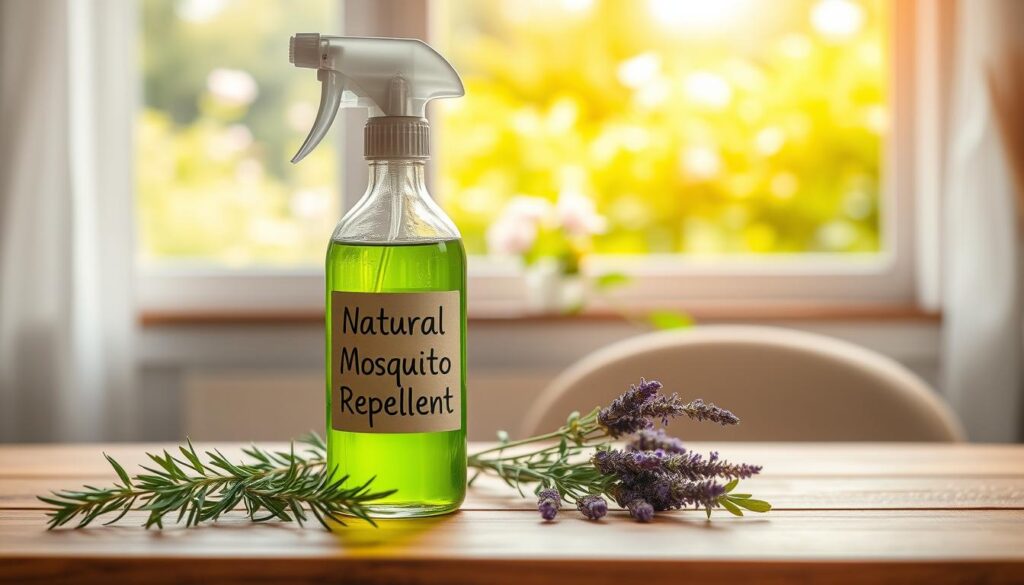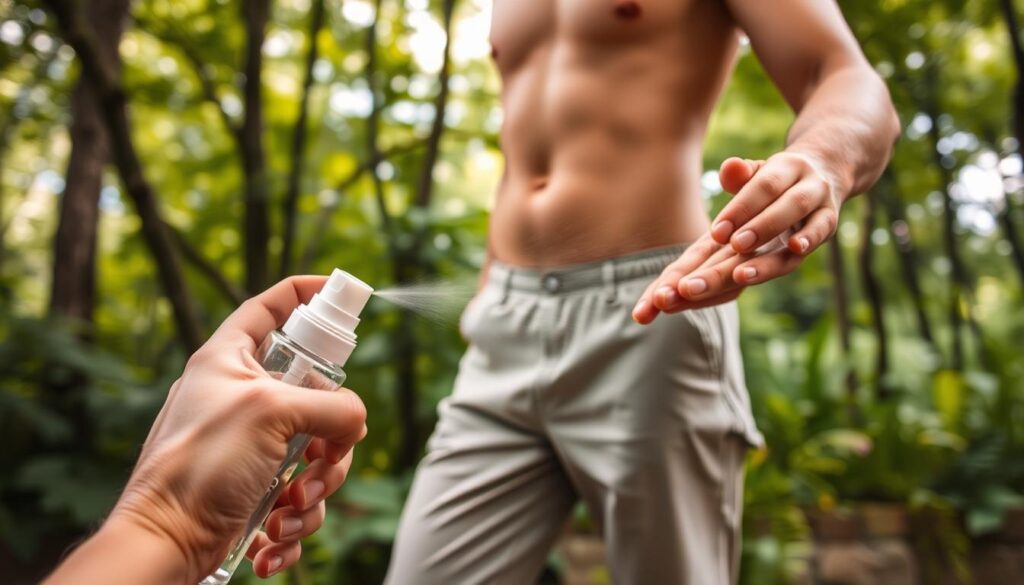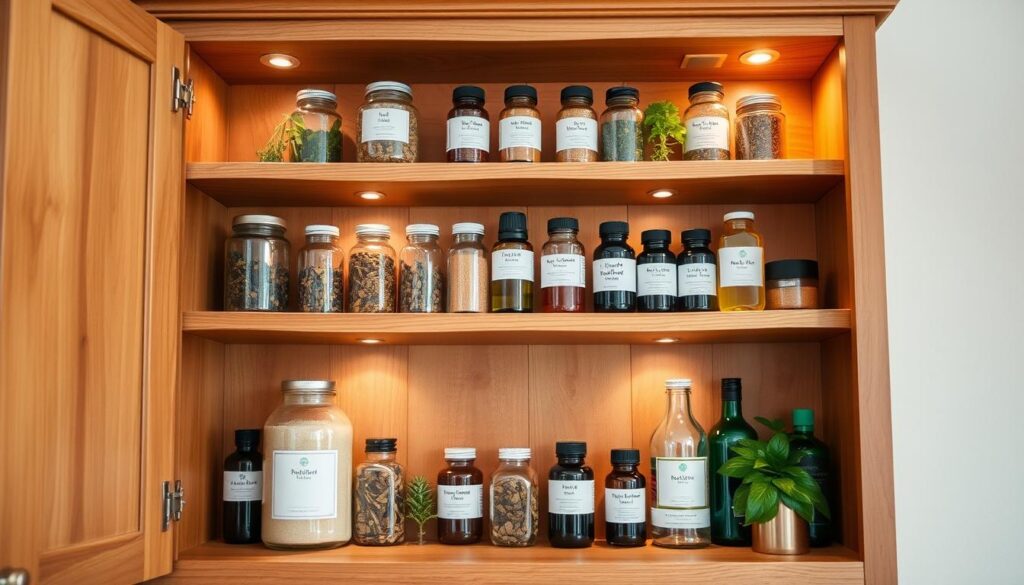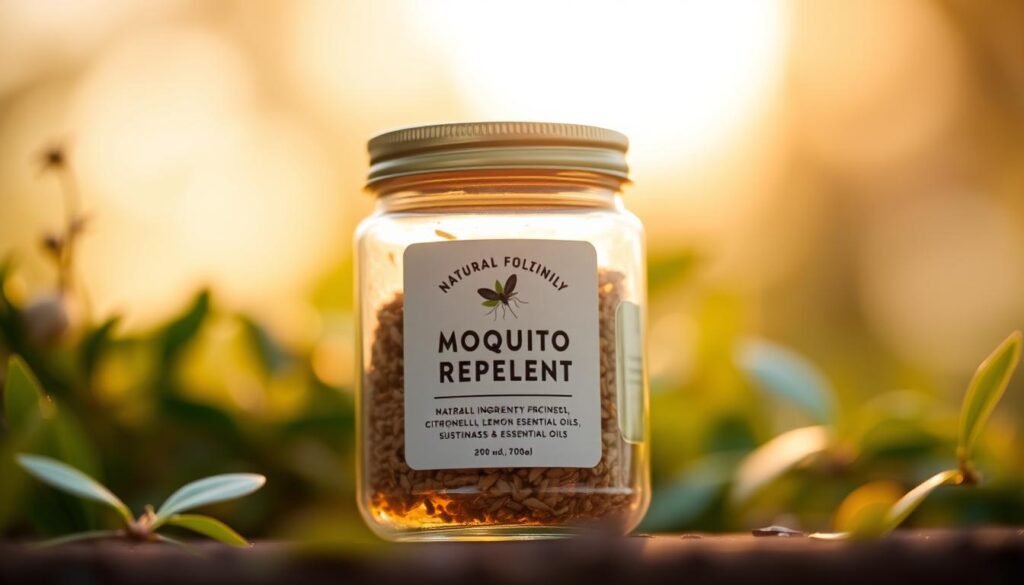
2 Easy Ways to Make Your Own Natural Mosquito Repellent for Outdoor Enjoyment
Are you tired of insects ruining your outdoor fun? Want to enjoy camping or a backyard BBQ without bugs bothering you?
Having a good effective insect repellent is key for a great time outside. Instead of using chemical-filled products, try making your own natural mosquito repellent at home.
Using natural ingredients avoids harsh chemicals and lets you tailor the repellent to your liking. In this article, we’ll show you two simple ways to make your own natural repellent. This way, you can enjoy the outdoors without mosquitoes.
Understanding Mosquito Repellents
Knowing how mosquito repellents work is important for enjoying the outdoors. These repellents are applied to skin, clothes, or surfaces to keep mosquitoes away. They prevent bites.
Mosquitoes are drawn to humans by scent, heat, and sight. Good repellents hide these attractants or create a barrier that mosquitoes don’t like.
What Are Mosquito Repellents?
Mosquito repellents are available in sprays, creams, and wearable devices. They have active ingredients that repel mosquitoes. DEET, picaridin, and oil of lemon eucalyptus are common in traditional repellents.
DEET-free repellents are becoming more popular. They are safer for health and the environment. These natural options can be as effective as DEET-based repellents.
Why Go Natural?
Choosing natural mosquito repellents is better for health and the planet. Chemical repellents can harm skin and pollute the environment.
Natural repellents use essential oils, which are safe for skin and effective. They are a green choice for mosquito control. They are among the best mosquito repellents for those who prefer eco-friendly options.
Here’s a comparison of some common natural ingredients used in mosquito repellents:
| Ingredient | Effectiveness | Skin Safety |
|---|---|---|
| Lemon Eucalyptus Oil | High | Generally Safe |
| Citronella Oil | Moderate | May Cause Irritation |
| Lavender Oil | Low to Moderate | Generally Safe |
When picking a natural mosquito repellent, think about how well it works and its safety for skin. This ensures a safe and enjoyable time outdoors.
Benefits of Homemade Repellents
Using homemade mosquito repellents has many benefits. You can adjust the ingredients and formula to fit your needs. This makes them a great choice for many people.
One big plus is how affordable they are. Commercial repellents can be pricey, even for natural ones. Making your own saves money and ensures quality.
Cost-Effective Solutions
Homemade repellents use cheap, easy-to-find ingredients. For example, essential oils like citronella and lemongrass make a mosquito repellent spray that’s both cheap and long-lasting.
Eco-Friendly Ingredients
Another great thing about homemade repellents is they’re good for the planet. Many store-bought ones have harsh chemicals that can harm the environment and your skin. Natural ingredients make a repellent that’s safe for you and the earth.
Choosing eco-friendly ingredients helps reduce the demand for harmful products. This choice supports a sustainable lifestyle. It makes spending time outdoors both fun and eco-friendly.
Ingredients for Your Repellent
The key to a great natural mosquito repellent is its ingredients. To make an effective insect repellent, knowing the right parts is crucial.
Essential Oils to Consider
Essential oils are vital in many natural mosquito repellents. Some top picks include:
Citronella oil is famous for its citrus smell and is great at keeping mosquitoes away. Other good choices are lemongrass oil, peppermint oil, and tea tree oil. Each has special qualities that help fight off mosquitoes.
| Essential Oil | Properties | Effectiveness |
|---|---|---|
| Citronella | Strong citrus scent | High |
| Lemongrass | Citrus flavor, insecticidal properties | High |
| Peppermint | Cooling effect, strong scent | Medium |
| Tea Tree | Antiseptic, antifungal properties | Medium |
Other Natural Ingredients
Ingredients other than essential oils can also boost your repellent’s power. These include:
Neem oil is known for fighting insects and can be mixed with essential oils for a strong repellent. Witch hazel is a good base, soothing the skin and keeping mosquitoes away.
By mixing these ingredients well, you can make a natural and effective insect repellent that keeps mosquitoes off.
Method One: Essential Oil Spray
Want to enjoy the outdoors without mosquitoes? Try making your own natural repellent with essential oils. It’s effective and lets you pick the scent and strength you like.
Required Ingredients
To make an essential oil spray, you’ll need a few things. Here’s what you’ll need:
| Ingredient | Quantity | Purpose |
|---|---|---|
| Essential Oil (e.g., Lemon, Eucalyptus, or Lavender) | 10-15 drops | Repels mosquitoes |
| Water | 1 cup | Dilutes the essential oil |
| Witch Hazel or Vodka | 1/4 cup | Acts as a preservative and helps blend the oil with water |
| Spray Bottle | 1 | Container for the repellent |
Step-by-Step Instructions
Here’s how to make your essential oil spray:
1. Mix the Ingredients: In a bowl, mix water and witch hazel or vodka. This helps the essential oil mix well with water.
2. Add Essential Oil: Put 10-15 drops of your chosen essential oil in the mix. Adjust the drops for your scent preference and skin type.
3. Blend Well: Stir the mix well to make sure the essential oil is fully mixed.
4. Fill the Spray Bottle: Pour the mix into a spray bottle.
5. Shake Before Use: Shake the bottle well before each use to mix the ingredients.

Tips for Best Results
For the best results, reapply the spray every few hours or after swimming or sweating. You can also spray it on clothes for longer protection. Remember, natural repellents might need more frequent reapplication compared to chemical-based ones.
By following these steps, you can make a natural mosquito repellent that works well and fits your needs.
Method Two: Herbal Infused Oil
Herbal infused oils are a natural way to keep mosquitoes away. They are great for people who love spending time outside. You can make a blend of herbs and oils to apply to your skin or clothes.
Required Ingredients
To make herbal infused oil, you need a few things. You’ll need a carrier oil like coconut or olive oil. Also, choose herbs like citronella, lemongrass, or basil that repel mosquitoes. It’s important to pick the right herbs because they work differently against mosquitoes.
Step-by-Step Instructions
Start by mixing your herbs with the carrier oil in a clean glass jar. Use about one part herbs to three parts oil. Then, seal the jar and let it sit in a cool, dark place for a few weeks. Shake it now and then.
After a few weeks, strain the mixture to get rid of the herbs. Now, your herbal infused oil is ready to use.
Make sure to store the oil right to keep it strong. Keep it in a cool, dark spot, away from sunlight.
Usage Tips
To use your herbal infused oil, just apply it to your skin or clothes. This DEET-free repellent is safe and works well. Reapply it often, like after swimming or sweating. Adding a few drops of essential oils can make it even better.
By making your own herbal infused oil, you can enjoy the outdoors without mosquitoes. It’s a natural and effective way to keep them away.
How to Apply Your Repellents
For effective mosquito protection, knowing how to apply your repellent is key.
The way you apply your homemade mosquito repellent affects its effectiveness and how long it lasts.
Best Practices for Application
When applying your mosquito repellent spray, make sure to cover all exposed skin and clothing.
Spray the repellent in a steady, back-and-forth motion, ensuring an even coverage.
Pay special attention to areas like ankles and wrists, which mosquitoes often target.
Avoid spraying directly on your face; instead, spray on your hands first and then apply to your face, avoiding the eyes and mouth.

It’s also crucial to follow the specific instructions for your homemade repellent, as different ingredients may have different application guidelines.
When to Reapply
The frequency of reapplying your mosquito repellent depends on several factors, including the type of ingredients used, the concentration of the active ingredients, and your level of outdoor activity.
Generally, you should reapply your repellent every 4 to 6 hours.
But if you’re sweating heavily or swimming, you may need to reapply more often.
| Activity Level | Reapplication Interval |
|---|---|
| Low (e.g., walking) | 6 hours |
| Moderate (e.g., hiking) | 4-5 hours |
| High (e.g., swimming, sweating heavily) | 2-3 hours |
By following these guidelines, you can enjoy a long-lasting mosquito repellent effect, keeping you protected during your outdoor activities.
Combining Repellents with Other Precautions
Mosquito repellents are great, but they’re just part of the solution. To really protect yourself, you need to use repellents along with other steps.
Wear Appropriate Clothing
Choosing the right clothes can help a lot. Wear long-sleeved shirts, long pants, and socks to cover your skin. This simple step can greatly improve your protection.
Make sure to tuck your pants into your socks and wear closed shoes. Also, pick light-colored clothes because mosquitoes like dark ones.
Use Mosquito Nets
Mosquito nets are a smart choice for keeping mosquitoes away, like when you’re sleeping outside. Make sure the net is tightly around your bed or where you rest to keep mosquitoes out.
For even more protection, use nets that have insect repellent on them. By using repellents and these extra steps, you can really boost your mosquito control. This way, you can enjoy the outdoors more safely.
Storing Your Repellent Effectively
To keep your natural mosquito repellent and lotion effective, proper storage is key. Storing them right not only extends their shelf life but also keeps their strength.
Best Storage Practices
For storing homemade mosquito repellents, a few easy steps can help a lot. First, keep them in a cool, dry spot away from sunlight. Heat and light can break down the essential oils, making them less effective.
Use dark glass bottles for storing your repellents. Dark glass keeps the oils safe from light damage. Make sure the bottles are tightly closed to keep air out and spoilage away.

Shelf Life of Homemade Repellents
The shelf life of your homemade mosquito repellent depends on its ingredients. Usually, repellents with essential oils can last months if stored right.
| Repellent Type | Main Ingredients | Shelf Life |
|---|---|---|
| Essential Oil Spray | Essential oils, water, and witch hazel | 6-9 months |
| Herbal Infused Oil | Herbs, carrier oil | 9-12 months |
Always check your repellents for spoilage signs like bad smells or texture changes. If you spot any, it’s time to throw it out and make a new batch.
Common Misconceptions About Mosquito Repellent
There’s a lot of confusion about mosquito repellents. People are unsure about what makes them effective. They also wonder if natural or chemical-based options are better.
Debunking Myths
Many think all mosquito repellents are the same. But, their effectiveness really depends on the ingredients and how much is in them. For example, DEET-free repellents are popular for being safe and working well. Natural options like citronella, lemongrass, or geraniol are also good choices for those who prefer natural products.
Some believe that more active ingredients mean longer protection. While it’s true that more can last longer, there’s a limit. For instance, using more than 50% DEET doesn’t make it last much longer.
Understanding Effectiveness
To know what makes a repellent good, look at its ingredients and how much is in it. The best mosquito repellent is one that works well, is safe, and fits what you want. Some might choose a DEET-based repellent for its proven effectiveness. Others might prefer a natural or DEET-free repellent.
When picking a repellent, think about how long you need protection, what you’ll be doing, and any allergies. Always use the product as directed to stay safe.
Environmental Impact of Different Repellents
When we look at mosquito repellents, we must think about their effect on the environment. The choice between natural and chemical repellents is not just about how well they work. It’s also about how they impact our planet.
Natural vs. Chemical-Based Options
Natural mosquito repellents come from things like citronella, lemongrass, and lavender. They are seen as eco-friendly because they break down easily and don’t pollute. Chemical repellents, on the other hand, use DEET, picaridin, or oil of lemon eucalyptus. While they work well, they can harm the environment if not used carefully.
| Characteristics | Natural Repellents | Chemical-Based Repellents |
|---|---|---|
| Eco-Friendliness | Highly biodegradable | Potential for chemical pollution |
| Effectiveness | Varies; generally shorter duration | Highly effective; longer duration |
| Safety | Generally safe for skin; fewer side effects | Can cause skin irritation; safety depends on concentration |
Advocating for Sustainable Practices
Choosing eco-friendly mosquito repellents is a way to help our planet. By picking natural repellents and using them wisely, we can reduce harm to the environment. It’s also key to support companies that make products in a green way and use eco-friendly packaging.

Additional Tips for Enjoying the Outdoors
There are many ways to enjoy the outdoors without bugs bothering you. Using a good mosquito repellent is key. But, adding a few more tips can make your outdoor time even better.
Creating a Mosquito-Free Zone
One great way to cut down on mosquitoes is to make a bug-free area outside. Get rid of standing water around your house. Mosquitoes lay eggs in water, so removing it helps a lot.
Key Steps to Create a Mosquito-Free Zone:
| Action | Benefit |
|---|---|
| Remove standing water from containers | Reduces mosquito breeding sites |
| Use mosquito repellent plants | Natural deterrent for mosquitoes |
| Install or repair screens on windows and doors | Prevents mosquitoes from entering homes |
Timing Your Outdoor Activities
Another smart move is to plan your outdoor time when mosquitoes aren’t around. Mosquitoes are most active at dawn and dusk. So, if you plan your activities for other times, you’ll have fewer bugs to deal with.
Using a long-lasting mosquito repellent along with these tips makes your outdoor time even more fun.
Conclusion: Enjoy Nature, Mosquito-Free!
Making your own natural mosquito repellent is easy and works well. It lets you enjoy the outdoors without mosquitoes. Plus, it helps the environment by avoiding harsh chemicals.
Benefits of Choosing Natural Repellents
Homemade mosquito repellents save money and are good for the planet. They’re better than store-bought ones because they don’t have harmful chemicals. This makes them safer for you and your family.
Adopting a Natural Lifestyle
Choosing natural repellents is part of living naturally. It makes your outdoor time better and helps the environment. You can use things like essential oils and herbs to make repellents that are safe for your skin and the earth.
Living naturally means making choices that help you and the planet. With your own repellent, you can enjoy nature without mosquitoes. It’s a way to support green practices.
FAQ
What are the benefits of using natural mosquito repellents over chemical-based ones?
Natural mosquito repellents are effective and safe. They are DEET-free, which is better for your skin and the environment. They are a great choice for those looking for a long-lasting repellent.
How often should I reapply homemade mosquito repellent for optimal protection?
The need to reapply depends on the repellent type and its ingredients. Usually, you should reapply every few hours. Also, after swimming or sweating to keep the repellent working well.
Can I use essential oils directly on my skin as a mosquito repellent?
No, you should not apply essential oils directly to your skin. Mix them with a carrier oil or other ingredients to make a safe lotion or spray. Undiluted essential oils can irritate your skin.
Are homemade mosquito repellents as effective as commercial products?
Yes, homemade repellents can be as effective as store-bought ones. They work well if made with the right ingredients and used correctly. They are a cost-effective and eco-friendly way to control mosquitoes.
How can I store my homemade mosquito repellent to maximize its shelf life?
Keep your homemade repellent in a cool, dark place. Avoid direct sunlight and heat sources. This will help keep it effective and reliable as an insect repellent.
Can I combine different natural ingredients to create a more effective mosquito repellent?
Yes, mixing different natural ingredients can make a strong and lasting repellent. Combining essential oils and herbal infused oils is a good way to make a DEET-free repellent.
Are there any specific precautions I should take when using homemade mosquito repellents on children?
Yes, when using repellents on kids, make sure the ingredients are safe for their skin and age. Always do a patch test first. This helps avoid any bad reactions.
Leave a Reply